Most classes start with a “Do Now” or “Warm-Up.” Mine often start with a hip-hop cypher. In a cypher, students stand in a circle, spread at equal distances, and one at a time, contribute a rhyme, line of poetry, thought, idea, or affirmation. This circle is the pedagogical foundation of the work I do in hip-hop education. 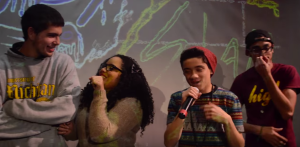
On a recent February afternoon, just outside of New York City, only miles from hip-hop’s birthplace in the South Bronx, I asked my high school students to answer this question in the opening cypher; why should schools include hip-hop in the curriculum?
Christian, now a junior, told us that, “hip-hop is a culture and it’s just like learning about the Aztecs or the Mayans. We learn the origin, customs, and traditions [of hip-hop].” Recalling a recent lesson on hip-hop’s fifth element, Christian went on to explain that hip-hop offers students an opportunity to learn, “”knowledge of self,” which is knowing who you are.”
Hip-hop was born in the South Bronx of the 1970s under oppressive conditions. In response to limited resources, poverty, and gang violence that riddled the New York City borough, black and Latino youth came together in an effort to improve the community, expressing themselves through rapping, breakdancing, graffiti art, and turntablism.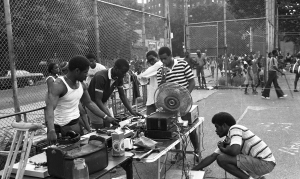
Over 40 years later, hip-hop has become a worldwide phenomenon, reaching every corner of the globe and shaping the identities of a whole generation of young people. Kids today are just as invested in hip-hop culture as they were in the 80s, 90s, and early 2000s.
It’s true that commercial hip-hop is often sexist, misogynistic, homophobic, and violent. The same is true of contemporary cinema, television, sports, and wider American culture. This is precisely why we should create spaces for our students to critique these messages.
Every year I teach a lesson on sexism in the media, using hip hop as a lens to explore a variety of texts. I start class by showing students a series of images depicting women in music videos, advertisements, and magazines. This year I showed students an image of a famous rapper blatantly objectifying a woman in one of his music videos. This elicits quite a response from teenagers, as one can imagine, but always leads to an engaging, critical dialogue about the nature of sexism in hip hop and the media.
I also show students how women are objectified on billboards and magazine covers, reading these images through a feminist lens while asking ourselves questions about the commercial motivations behind these images.
- Who are these images intended for?
- Who makes decisions about advertisement content?
- What is the motivation of those who are trying to sell us these products?
- What is our responsibility as consumers of these images?
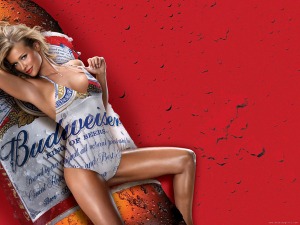
We also analyze hip-hop lyrics with the same questions in mind. We compare artists who promote misogyny with those who offer a counter-narrative, aiming to humanize women and critique the culture of sexism in hip-hop and society. Artists we’ve studied include Lupe Fiasco, Kendrick Lamar, Mos Def, Queen Latifah, Lauryn Hill, and J. Cole.
When speaking with educators, I’m often surprised that their perception of hip-hop only extends as far as the radio. Many teachers don’t realize the radio only broadcasts a corporate, commercial brand of rap music. There are countless other artists with messages that are positive, uplifting, and socially conscious, but they often go unheard. I think we should include both kinds of rap music in our classrooms if we want to have really meaningful, well-rounded discussions. We must be careful not to demonize rap music based solely on commercial hip-hop. If we do, we are enacting a form of symbolic violence on students who identify with hip-hop culture and consider it a part of their identity.
Often times, in my classroom this kind of dialogue leads to powerful discussions about hyper-capitalism and the influence of corporations on the media we consume. One lesson in particular asks students to engage in a role-play where they assume the identities of corporate record executives presented with the task of signing one artist. Students must choose between signing a rapper whose lyrics are filled with violence, opulence, and degrading language towards women – and a rapper who critiques these messages in a politically, morally, and socially responsible way. Ultimately students must decide in their persona as record executives, what’s more important? profits or people?
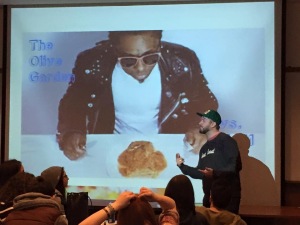 As an English Language Arts teacher, I’m tasked with helping students develop literacy skills. But what does it mean to be literate in the 21st century? What kinds of “texts” are relevant to students and how can we help them become more critical consumers of those texts?
As an English Language Arts teacher, I’m tasked with helping students develop literacy skills. But what does it mean to be literate in the 21st century? What kinds of “texts” are relevant to students and how can we help them become more critical consumers of those texts?
If we can agree that literacy means understanding and constructing meaning from the world around us, then popular culture, especially hip-hop, represents a site rich with teaching and learning possibilities. Literacy in the 21st century extends far beyond the written word and page. Young people are saturated with advertisements, music videos, films, video games, and blogs. If we aren’t helping students develop the tools necessary to think critically about these forms of media, we are doing them a disservice.
When we consider the influence of hip-hop culture, for better or worse, on the young people in our classrooms, we are presented with an opportunity to engage urban youth in a way that speaks to their cultural identities while, at the same time, building critical literacy skills that are transferable to every other discipline.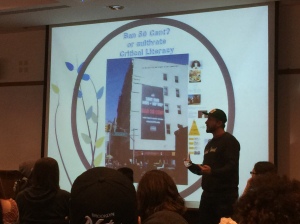
As our classrooms become more and more diverse, we have a responsibility to address social inequities affecting urban youth. Sometimes this means the curriculum itself. Often times, these young people are described as disengaged and unmotivated, but what efforts are we making to affirm their social and cultural identities in schools? Hip-hop isn’t the solution to every challenge in urban education, but it represents an important, culturally relevant, critically engaging set of opportunities for meaningful learning.

Wonderfully said. It’s great that you’ve also incorporated how commercial rap is viewed. Good to have multiple perspectives.
Great job. As a new student at Teachers College I am inspired to continue this man’s work. I am proud that’s my educators are doing it big like this.
Reblogged this on rickyfountaine.
Where were you a few years ago? The work you are doing is great. I hope this is the beginning of a trend that primary schools will pick up on soon. Are there more teachers using Hip-Hop in education? I would like to know the stats on that.
Reblogged this on Zora Lola and commented:
I woke up this morning feeling a way. Here is some original thought that has motivated me to change my direction today. Away from that “feeling a way.” Being productive and changing lives by encouraging people to think outside of the box or rather look inside of the box to grasp what the builder of the box was thinking so you can rip that bitch apart and build something better. Not a box, maybe a large encompassing circle. A cypher.
“You don’t say good luck, you say don’t give up. It’s the fire.” (C) The Roots f/ John Legend The Fire
Love this! I’m a teacher as well and I agree with all of your points. Students need material these days that they can relate to.
Reblogged this on Uvcw's Blog.
Mr. Mooney,
I would like to know how your school has responded to your inclusion of Hip Hop into the curriculum.
I have found that there is a lot of apprehension on the part of my administrators to accept the value of the ideas within the culture because of how they perceive Hip Hop culture in general.
For 10 years I taught freely using Hip Hop wherever I could fit it into the state curriculum. Three years ago we got a new principal and one of his first moves was to force me not to play music between classes, and pretty much told me it was Hip Hop he had a problem with. Unfortunately, that contentious attitude limited what I could do in my classroom.
Reblogged this on royalty ramblings and commented:
The importance of educating through the use of Hip-Hop.
Hi Brian
Just wondering if you know how I could get into contact with the photographer of that black & white Bronx photo (providing he/she is still alive)? I want to print it on a tshirt (for myself, not to distribute it) and thought I better seek permission first.
Thank you,
Ryan.
[…] This is the type of conversation that a single hip hop song can bring into the classroom. Just imagine what the entire Hip Hop genre could accomplish. Back to Mooney for more of that. […]
I think Hip Hop should be included. It also allows our youth to learn how to think critically. #DavidGift #LightMusick
I have a unit on Hip Hop in my college course at a small college on the east coast, and I was told by another faculty member (who has been really attacking me at every turn) that I should not teach it. His reasoning was that it would incite my male students to have sexual feelings towards me, as in this unit we critique various culturally-specific notions of female desirability. He made me feel like I was doing something predatory by teaching this subject. I specialised in this type of gender analysis in graduate school , and now I feel like I am doing something wrong by teaching my field of expertise. None of my students have complained. I have in the past had a few comments on evaluations from students about my being attractive, and now I worry if another such comment pops up I will be seen as having “invited” the attention because of my course content.
[…] https://bemoons.wordpress.com/2015/05/25/why-schools-should-include-hip-hop-in-the-curriculum/commen… […]
Hi Brian,
I’m a high school teacher in New Zealand and have the go ahead from my head master to start a hip hop club next year. I’m in the process of working out how it will run and what we will cover. Are you able to share any info, lesson plans, etc? I completely understand if not, but as we are a minority I would appreciate any advice or assistance you can offer.
Great to see these ideas are starting yo take hold!
All the best,
Matt
Hey Matt! Great to hear from you and best of luck with the hip hop club. I wrote a book that came out last year which should really help. – Breakbeat Pedagogy: Hip Hop and Spoken Word Beyond the Classroom Walls (Counterpoints) https://www.amazon.com/dp/1433133245/ref=cm_sw_r_cp_api_oO3xzbTTQ2VXR.
Just bought a copy! Can’t wait to get hold of it!